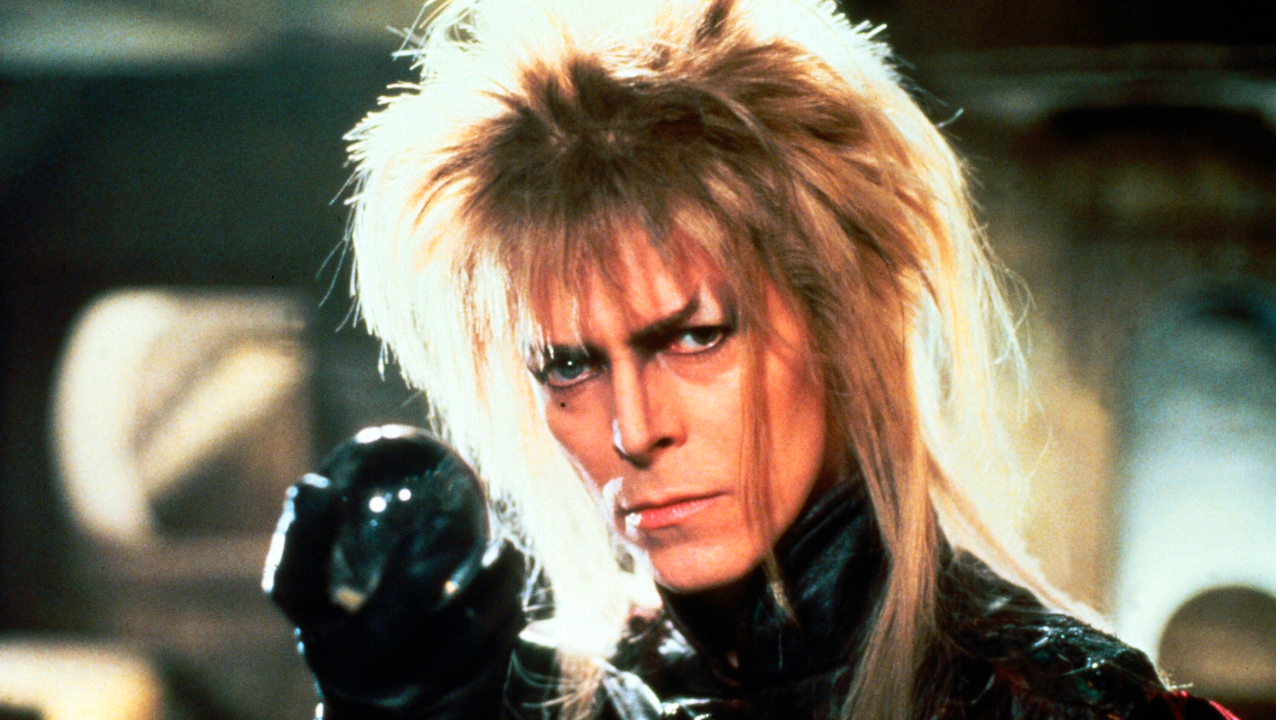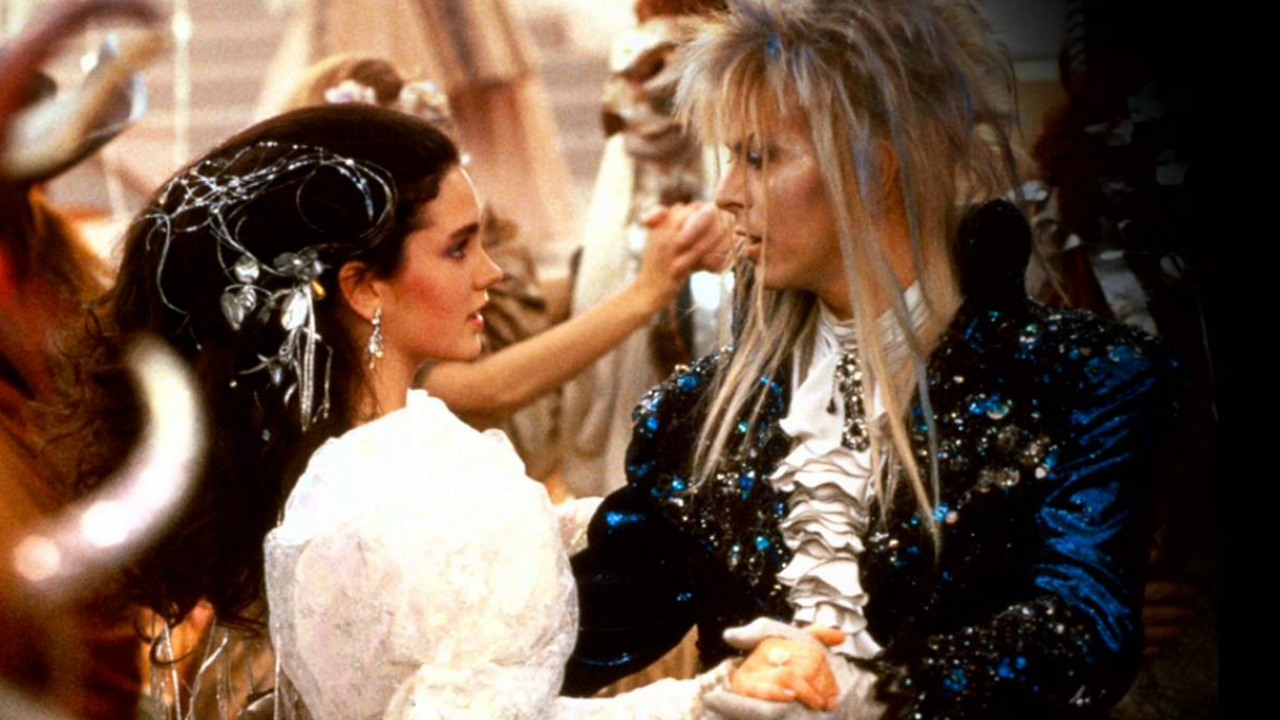31 years on - How David Bowie made Labyrinth’s goblin king a cultural icon

You may never have watched Jim Henson’s Labyrinth (in which case correct that the first chance you get) but you’ll know Jareth. Or at least his crotch, which for some reason is the first thing everyone thinks about. You’re doing it now. Stop it.
David Bowie’s turn as the goblin king caused equal parts confusion and mockery in the initial years following the film’s release, but has since settled into a staple of cultural iconography. Everyone recognises the hair, the songs, that… other bit. The question is why? What was it about one of the world’s most famous rock stars dancing with puppets that sunk so deeply into people’s consciousness?
It’s partly to do with the fact that Bowie was a rock star. He wrote and performed the soundtrack, making the character far closer to his stage alter egos than his other film roles. In most of his cinematic appearances there was always the slightly jarring disconnect of ‘holy shit, that’s David Bowie being David Bowie’ whenever he appeared on screen. In Labyrinth that’s less of an issue because can you imagine anything more ‘David Bowie being David Bowie’ than Jareth? The character’s musical focus and performance made it much closer to things like Ziggy Stardust than a pure acting role.
“He’s like the devil. He’s completely alluring, completely a character that draws people in and that people are infatuated with,” said George Lucas while promoting the film (which he also executive produced), adding, “and what better person to play that than a rock star?” It’s that rock star edge that bleeds through Bowie’s performance, giving him an almost serpentine charisma. He purrs and glances, coos and cajoles. Then breaks out a synth beat and dances with a man’s hand in a rubber face.
It’s all rather confusing. Especially given the sexual subtext. While there’s nothing explicit, Jennifer Connelly's character Sarah and Jareth's relationship appeared to have some very adult layers for a kids film. Especially as the movie progresses and Sarah starts to get an edge over the goblin king. Jareth’s menace turns to pleading and, with the song As The World Falls Down, blatant seduction:
He needs her more than she does him and, later, when she still refuses to do what he wants there’s almost an abusive edge as he positions himself as the victim, telling her:
“Everything that you wanted I have done. You asked that the child be taken and I took him. You cowered before me; I was frightening. I have reordered time. I have turned the world upside down. And I have done it all for you. I’m exhausted from living up to your expectations. Isn’t that generous?”
Sign up for the Total Film Newsletter
Bringing all the latest movie news, features, and reviews to your inbox
Now, kids might be young but they’re not stupid, and the allure of a charismatic magical admirer willing to move heaven and Earth for you is pretty much a mainstay of fairy tales, books and films - Sleeping Beauty, Cinderella, Snow White: you didn’t think it was all about the singing animals did you? It probably explains why there’s no shortage of people today who saw the film when younger and talk about Jareth evoking new and untested feelings when they first encountered him.
If you think the idea of Jareth acting in part as a sexualised guardian to adulthood is reading too much into it, then bear in mind a 1987 interview where Jim Henson told French magazine Ecran Fantastique that, "David Bowie embodies a certain maturity, with his sexuality, his disturbing aspect, all sorts of things that characterise the adult world." In another interview Bowie is even more blatant: “I think Jareth is, at best, a romantic, but, at worst, he’s a spoilt child, vain and temperamental: a kind of like a rock and roll star! I think he has inherited his Kingdom of Goblins reluctantly and runs it under duress. But he’s completely smitten by the character Sarah. She’s pretty strong-willed, pure and, psychologically I guess, the Virgin Mary figure that some guys seem to yearn for."

The idea of developing different feelings as you grow up fits in with the story’s message to some degree as well, and makes the goblin king subconsciously meaningful and symbolic as the messenger. Sarah starts as a spoilt and whiney 15-year-old, resenting the responsibility of her little brother. But, after her encounter with Jareth, appears to have accepted adulthood on her own terms, if not the king himself. Although part of the message seems to be that there’s always a little room for childish things.
The final scene sees Sarah home, clearing away her toys, before admitting she still needs her new friends “every now and again,” before they all appear to end the film on one last dance. After all, what’s the point in growing up if you can’t keep a little bit of the inner child alive? The final shot is of Jareth, in the form of an owl, watching the dancing before flying off into the night. He might as well have said ‘my work here is done’ as he does.

I'm GamesRadar's Managing Editor for guides, which means I run GamesRadar's guides and tips content. I also write reviews, previews and features, largely about horror, action adventure, FPS and open world games. I previously worked on Kotaku, and the Official PlayStation Magazine and website.


